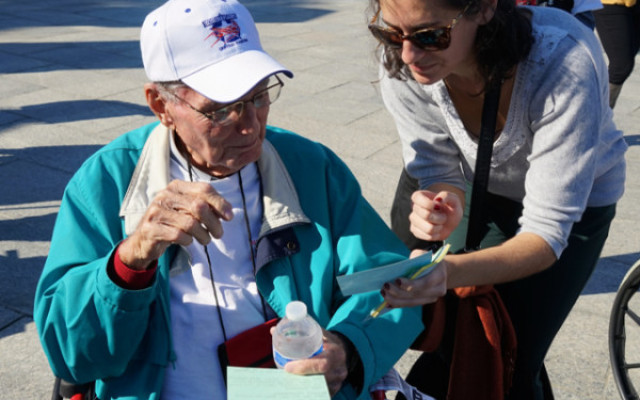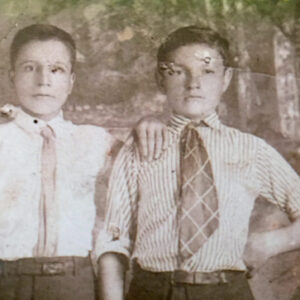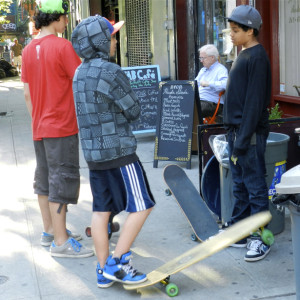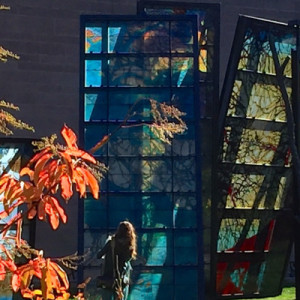Leaving a Legacy
People are like stained glass windows. They sparkle and shine when the sun is out, but when the darkness sets in; their true beauty is revealed only if there is a light from within. – Elizabeth Kubler Ross
Experts in the aging field use the term productive aging to celebrate the capabilities of older adults to continue to live creative full lives. Researchers have documented this vitality in studies about the social and economic contributions possible with a positive attitude, creative expression and a zest for life regardless of ethnicity, level of education, marital status or income. Recent studies highlight the importance of regular participation in social activities, close friendships, visits with family, and lifelong learning experiences to reinforce or develop new knowledge and skills, in engaging people to improve their own lives and the lives of others as they age.
Muriel Lloyd lived such a life. Even though she suffered and eventually died from lymphoma, her kind spirit and sage wisdom continued to inspire and sustain countless people. During the last years of her life, Muriel participated in a study on the qualities of productive aging at Memorial Sloan-Kettering Cancer Center in New York City. Under principal investigator and renowned geriatric researcher, Dr. Jimmie Holland, Muriel dazzled the doctors with her unyielding love of living and belief that cancer cannot kill creativity even as it breaks down the body. That was her legacy.
The Muriel Lloyd Inspiration Fund honors Muriel by supporting the ongoing research of Dr. Holland and her team to investigate research-based methods of counseling and communication to improve the quality of life for geriatric cancer patients. In 2014, the Fund will help sustain the work of Dr. Christian Nelson, the team’s psychologist, as he explores ways for patients to leave a legacy through creative writing and art.
Muriel’s dear friend, prolific writer and Guggenheim Fellowship recepient Susan Cheever, has written an inspirational essay about the adventure of life. Read Susan’s reflections on Muriel’s inspirational life.
Research Supported by the Fund
Andrew Roth MD, Stephanie Napolitano MA, Joslyn Kenowitz BA, Christian Nelson PhD, Elizabeth Harvey PhD, Anne Martin PhD, and Jimmie Holland, MD, Memorial Sloan-Kettering Cancer Center
INTRODUCTION
By the year 2030, 20% of the U.S. population will be over the age of 65. The elderly comprise 61% of cancer survivors. People in this cohort experience increasing physical losses of mobility, vision, hearing, mental acuity, and stamina, usually along with one or more comorbid medical problems. Personal losses, such as the death of a spouse, family members, and friends of a similar age isolate older adults even more, often forcing them to deal with illness alone. This sense of isolation can be further exacerbated by retirement and geographic scattering of families. Among the elderly with chronic illness, the frequency of depression (15-25% or greater in medically ill groups) often interferes with the ability to make treatment decisions and adhere to treatment regimens. While older people are generally thought to cope better with illness and loss than younger individuals, the presence of physical aging-related problems, co-morbid medical conditions and their symptom burden can overwhelm their strong coping ability, leading to increased vulnerability to distress, anxiety, and depression.
PRIMARY OBJECTIVES:
To test the feasibility, tolerability, and acceptability of the Cancer and Aging: Reflections for Elders (CARE) Intervention, by examining the rates of eligibility, acceptance, and adherence. CARE will be tested in two psychotherapy formats:
- An individual intervention delivered by phone
- A group intervention
SECONDARY OBJECTIVES:
To examine the impact of the CARE Intervention in both formats on depressive symptoms, anxiety, demoralization, coping, loneliness and isolation, and spirituality compared to the control group.
METHODS
Patients 70 or older that have lung, prostate, breast, lymphoma, or gynecological cancer, are greater than 6 months post diagnosis, and are on current treatment at MSKCC were contacted about participation in the study. Those who expressed interest and reported moderate distress were consented to the study. Eligible patients were randomly assigned to either the control group, in which they received calls from a social worker, or the intervention arm, in which they received the CARE intervention from a mental health professional. All patients received 5 sessions over 7 weeks. Outcome data (anxiety, depression, demoralization, loneliness, and spiritual well-being) was assessed at baseline, post-treatment, and 2 months after treatment.
MEASURES
Pre screening:
•Distress Thermometer
•Hospital Anxiety and Depression Scale •Karnofsky Performance Status
•Blessed Orientation-Memory-Concentration Test
Baseline, post-treatment, and 4m follow-up: •Sociodemographic (Baseline only) •Distress Thermometer
•Hospital Anxiety and Depression Scale •UCLA Loneliness Scale
•The COPE Inventory
•Demoralization Scale
•FACIT Spiritual Well-Being Scale
•Patient Satisfaction Survey (Intervention Arm only)
RESULTS
To date, 36 patients have been enrolled and 32 subjects (11 control and 21 intervention) have completed the 2 month follow-up. The average age of the patients is 76+4 years old, and 64% are male. Of the 21 patients randomized to the intervention arm, all subjects completed (100%) the intervention. For these patients, the preliminary results indicate they had a reduction in depression, anxiety, demoralization, and loneliness. They also had an increase in coping and spiritual well-being. These changes produced small (d=.2) to moderate (d=.5) effects sizes. At the last follow-up assessment, patients testimonials included: “I can laugh more than ever,” “[I] have a better outlook on cancer, a way to reflect on disease and rest of life,” and “Questions made [me] look back upon life and appreciate support and love [I] had.”
CONCLUSIONS
Research Implications:
Preliminary results suggest the CARE Intervention is feasible and effective, supporting the continuation of a larger randomized trial.
Clinical Implications:
Older cancer patients are unique as compared to younger cancer patients and should have support, such as the CARE Intervention, that is tailored to fit their specific issues.
Acknowledgement of funding: Silbermann Foundation, CALGB Foundation, and the Muriel Duenewald Lloyd Inspiration Fund.












No Comments Yet!
You can be first to comment this post!